The Strategic Edge of Hiring Offshore Database Administrators
Think about how your company’s flagship application suddenly slows to a crawl during a major product launch. Customer orders aren’t processing, internal teams are scrambling, and the entire operation feels paralyzed.
What’s the problem? A poorly optimized database query that went unnoticed in routine operations. In moments like these, the true value of a Database Administrator (DBA) comes into focus.
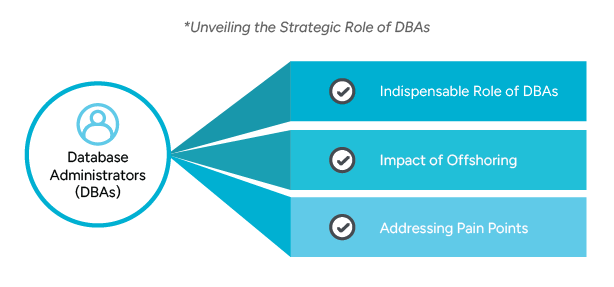
Today’s DBAs are strategic architects who design, optimize, and safeguard the databases that drive modern business. With companies generating more data than ever before, having the right expertise to manage, secure, and scale these systems has become a business-critical priority.
However, as competition for onshore talent heats up, forward-thinking businesses are tapping into offshore Database Administrators to fill the gap with cost-effective, specialized expertise.
Below, we’ll explore why Database Administrators are indispensable, how offshoring amplifies their impact, and how this process addresses common pain points for decision-makers in data-driven industries.
In-Demand Skills for Modern DBAs
Structured Query Language (SQL) Mastery
SQL remains the gold standard for querying and manipulating data across various platforms. Whether working with Microsoft SQL Server, IBM Db2, or Oracle, DBAs should be fluent in writing complex queries, stored procedures, and triggers.
Expertise in Major Database Platforms
While no DBA is expected to be an expert in every database system, hands-on experience with at least one or two major players—Oracle, Microsoft SQL Server, MySQL, MongoDB, IBM Db2, PostgreSQL, Redis—is essential. Each platform has its unique features and quirks.
Performance Optimization
Understanding how to optimize queries, utilize indexing strategies, and tune database parameters can drastically reduce resource consumption. This skill set is especially prized in cloud environments, where costs are tied to consumption.
Database Security
With high-profile breaches making headlines, security awareness has never been more critical. DBAs should be adept at least-privilege models, encryption methodologies, and patch management.
Backup and Recovery Techniques
Failure is inevitable—hardware breaks, malicious attacks happen, and natural disasters strike. A skilled DBA anticipates these failures with robust backup schedules and proven disaster recovery plans that minimize downtime.
Knowledge of DevOps and Containerization
As organizations adopt DevOps practices, DBAs increasingly need familiarity with tools like Docker, Kubernetes, and Git to manage and deploy database services in continuous integration and continuous deployment (CI/CD) pipelines.
Scripting and Programming
Many DBAs come from a programming background, making them adept at C, Java, or other languages. Knowledge of scripting languages like Python or PowerShell can streamline automation tasks.
Analytical and Problem-Solving Skills
Databases often sprawl across different systems, requiring DBAs to engage in creative problem-solving, especially when diagnosing performance bottlenecks or addressing unexpected failures.
Combining these skills with strong communication and documentation practices is what differentiates an average DBA from a top-tier professional.
Industry Trends Driving Demand, Especially for Offshore DBAs

According to an article on TechNewsWorld, DBAs see brighter job prospects due to ongoing IT challenges that arise from increasingly complex infrastructures. Enterprises are also expanding their digital footprints, which in turn intensifies the need for specialized expertise.
Offshoring and Remote Work
It’s no secret that major corporations—including Google, Facebook, IBM, Nike, and Coca-Cola—regularly outsource certain IT functions to specialized offshore teams. This approach yields:
The Growing Complexity in Data Environments
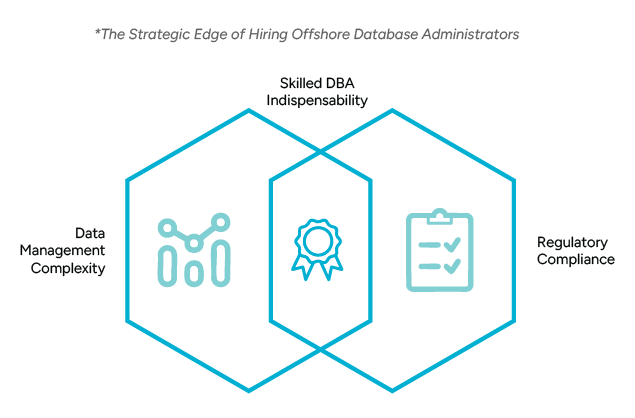
As businesses generate and manage massive volumes of data, the complexity of their data environments skyrockets. Today’s DBAs are tasked with integrating cloud databases alongside on-premise systems, managing data lakes, and ensuring compliance with regulations like GDPR and HIPAA. The increasing complexity has made skilled DBAs indispensable for organizations juggling multiple frameworks and environments.
The Push Toward Cloud Adoption
With more businesses embracing cloud solutions like AWS, Microsoft Azure, and Google Cloud, modern DBAs are expected to bring a flexible, cloud-first mindset. From virtualization to infrastructure-as-code, they need to navigate dynamic, scalable environments that can adapt to business needs in real time.
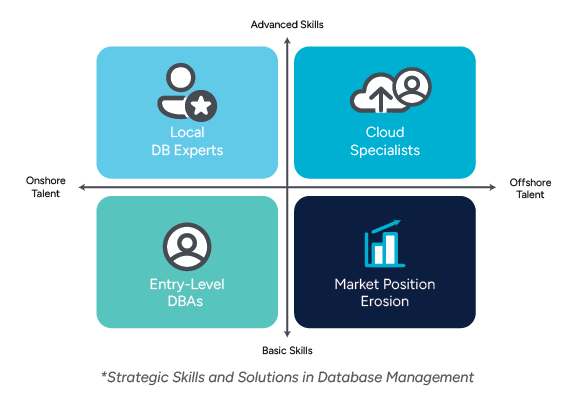
The bottom line? As data management becomes more complex, businesses need highly skilled DBAs with advanced technical expertise. Offshoring provides an efficient way to bridge talent gaps, giving companies access to specialists who can help them stay ahead in their respective industries.
Salary Insights: Onshore vs. Offshore
DBAs tend to earn on the high side among IT professionals, reflecting their pivotal role. Several factors influence compensation: years of experience, specific industry (finance vs. education), and specialized skill sets (like Oracle RAC or SQL performance tuning).
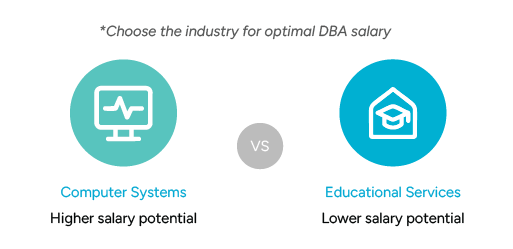
- The median salary for a Database Administrator in the U.S. was $117,450 in May 2023. Those employed in the computer systems sector can nearly double that figure compared to those in educational services.
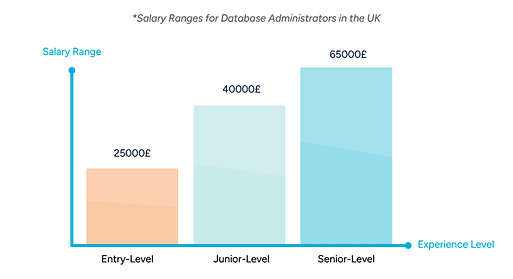
- For entry-level roles in the UK, starting salaries typically range from £23,000 to £28,000, according to Prospects. This can climb to £35,000 to £45,000 for junior positions with a bit of experience and can go up to £65,000 or more for senior-level roles.
Offshoring these roles can translate to significant cost advantages for businesses, as the salary expectations in many outsourcing hotspots, such as parts of Asia, Eastern Europe, and Latin America, are typically lower than in Western Europe or the United States.
While specific offshore salary ranges can vary widely based on the region and level of expertise, companies frequently cite cost savings of 30% to 60% when hiring offshore DBAs compared to onshore talent.
Client Pain Points: The Risks of Operating Without Skilled DBAs
When companies lack a DBA—or rely on underqualified database personnel—they risk numerous operational, financial, and security pitfalls. Let’s examine some of the common pain points:
Slow Data Retrieval and Performance Issues
Databases that aren’t regularly tuned can develop performance bottlenecks. Critical queries take far longer to execute, user satisfaction plummets, and the organization may incur higher costs—especially in cloud pay-as-you-go models. Even a single inefficient query can balloon compute usage.
Security Vulnerabilities and Data Breaches
A DBA is the “last line of defense” for organizational data. Without stringent security measures, like patch management, role-based access, and encryption, databases become prime targets for cybercriminals. According to a data breach study sponsored by IBM, the average global cost of a data breach sits at $3.92 million, with breaches taking an average of 279 days to identify and contain. A skilled DBA significantly reduces the odds of such catastrophes.
Inadequate Disaster Recovery
A lost or corrupted database can halt operations. If regular backups, verifications, and disaster recovery drills aren’t performed, organizations can face extended downtime. This is especially damning for industries like finance or e-commerce, where every minute of downtime translates to lost revenue and damaged reputations.
Poor Documentation and Knowledge Gaps
Databases evolve. Tables, schemas, and stored procedures change over time. Without proper documentation, confusion reigns. Developers deploy code that conflicts with existing structures, and auditing becomes a nightmare. Skilled DBAs maintain comprehensive documentation and version control—ensuring that knowledge is accessible to everyone on the team.
Escalating Costs
Performance issues, data breaches, and inefficiencies don’t just impede operations; they also inflate costs. Poorly optimized queries, for example, ramp up cloud compute charges. Recovering from a breach can mean steep regulatory fines, legal fees, and the loss of customer trust. Not having a designated DBA often results in a patchwork of responsibilities that fall on overloaded developers or IT generalists.
How Offshoring Addresses These Challenges
Given these pain points, how does offshoring a DBA role resolve them?
1. 24/7 Monitoring and Rapid Response
With teams dispersed across time zones, businesses can have continuous database monitoring. If an issue arises at 3 AM local time, an offshore DBA can address it immediately, preventing extended downtime or data loss.
2. Access to Specialized Talent Pools
Offshoring opens the door to DBAs with specialized skill sets—like NoSQL databases, data warehousing, or cloud migration expertise—who may be hard to find or expensive to hire locally. Offshore talent pools are often deep, especially in tech-savvy regions like India, Eastern Europe, or parts of South America.
3. Cost-Effective Scalability
Hiring offshore allows companies to scale up or down without bearing the full cost of local salaries, employee benefits, and real estate expenses. This agility is invaluable during peak data loads or special projects, such as migrating to a new database platform.
4. Enhanced Security Posture
While offshoring can introduce its own data security considerations (like ensuring compliance with local data protection laws), many mature offshore markets have strict laws and robust infrastructure. Skilled offshore DBAs are well-versed in configuring encrypted connections, setting up secure VPNs, and implementing industry best practices.
5. Reduced Risk of Knowledge Gaps
Reputable offshore providers often maintain well-documented processes, training, and knowledge transfer protocols. This structured approach mitigates the risk that knowledge will be lost if a single DBA leaves the organization.
6. Faster Project Completion Times
By distributing workload across geographies, an organization can maintain a near-constant cycle of development and maintenance. Work done in one time zone can be tested and validated by teams in another, compressing project timelines.
Best Practices for Hiring Offshore DBAs
To maximize the benefits of offshoring, decision-makers should prioritize the following:
Unlocking the True Value of Offshore Database Administrators.
Successful offshoring doesn’t happen by chance. It’s the result of strategic planning, thorough vetting, and an ongoing commitment to partnership. By approaching the process with professionalism and a clear vision, you’ll position your organization to maximize the benefits and outpace competitors who may still be struggling with rising data complexities and local talent constraints.
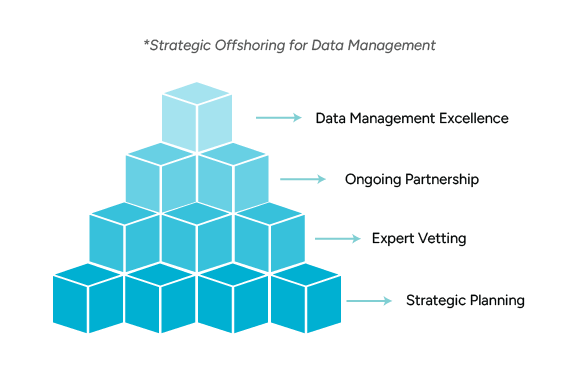
Data has become the backbone of every decision, innovation, and customer experience. And when data is poorly managed, it can bottleneck progress and create costly risks.
On the flip side, expert database administration transforms your data into an asset that can help you scale smarter and stay ahead of the competition. Hence, having the right team is your growth multiplier.
At LevelUp, we specialize in providing offshore database administrators (DBAs) who thrive in the high-stakes world of data. From performance tuning and airtight security to seamless cloud integration, our team transforms database management from a headache into a strategic asset.
With our collaborative approach, your organization doesn’t just keep up. Instead, it leads to an era where data drives everything.





